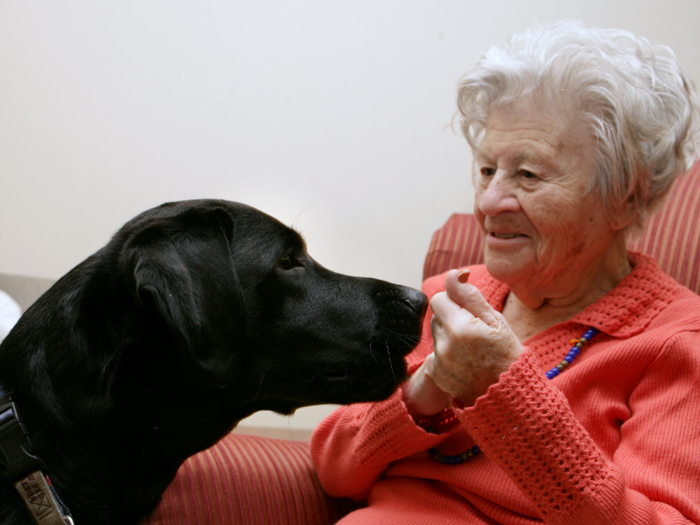- Home
- slideshows
- miscellaneous
- 7 science-backed ways a pet can be the best thing for your health
7 science-backed ways a pet can be the best thing for your health
Pets are good for your heart.

Dogs reduce stress levels.

A 2012 meta-analysis looked at 69 studies on how pets affect their owners, and most of them had one thing in common: stress reduction.
In addition to having lower rates of high blood pressure, pet owners showed a reduction of cortisol, the body's stress hormone. In one experiment, children were put in a socially stressful environment — one group had a friendly adult with them, and another had a friendly dog. The children with the friendly dog had lower cortisol levels. The more they played with the dog, the less stressed they were.
Pet owners visit the doctor less often.

That same meta-analysis looked at dog and cat owners and the frequency of their visits to the doctor. It found that, on average, dog and cat owners visited the doctor's office less often. They also slept better and took fewer days off from work annually.
If doctor's visits are taken as a sign of poorer health, the study concludes, dog and cat owners are the healthier group.
Pets are good for old age.

For the elderly, owning a pet might make life a lot better, especially if they're living alone.
According to an April 2019 survey by the University of Michigan, 73% of older pet owners said their pet provided them with a sense of purpose. On top of that, 79% said their pets reduced their stress, and 65% said their pets helped them connect with other people.
All of these factors contribute to healthy aging. A 2017 study found that pet ownership was good for overall health in older people. In the study, pets were described as a "psychological deterrent to loneliness."
Horses may be able to help you recover from trauma.

It's not just dogs and cats that can help you live a healthier life. One 2008 study looked at horses and their relationship with people, and found that they can help us cope with trauma.
The study examined a handful of patients who spent time riding horses as a therapy exercise, and found that those patients were able to cope with trauma better than patients who spent no time with horses.
Having a dog might benefit children with autism.

Every child with autism with autism is different, which means that having a pet affects every child differently.
A study from 2016 examined dog ownership in families with autistic children, and found that, in general, having a dog helped children with communication, cooperation, and attention span. In many cases, having a dog calmed the child.
According to Autism Speaks, parents should carefully consider getting a pet if their child has autism. A hyperactive dog can have the opposite effect on the child, who may become agitated or stressed.
Animal therapy might be able to replace pain medication.

While pain medication serves a very real purpose — to help people cope with intense pain for any number of reasons — pain tolerance can vary from person to person.
In this 2014 study, patients recovering from total joint replacement surgery were treated using animal-assisted therapy (AAT), in addition to taking traditional pain medication. Other patients were given nothing but the pain medication. The patients with AAT recovered more quickly than those without.
"The animal-human connection is powerful in reducing stress and in generating a sense of well-being," Julia Havey, the lead author and researcher at Loyola University Health System, said in a press release for the study.
Popular Right Now
Popular Keywords
Advertisement